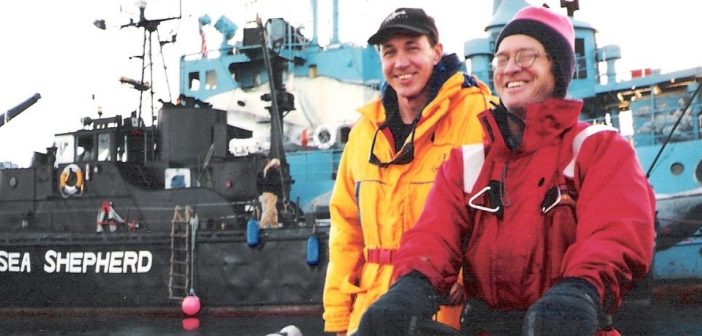Sea Shepherd Conservation Society may be one of the most well-known animal protection organizations out there, known best for their direct actions, controversial tactics and presence in the media. Perhaps the most widely known example of that media presence is the television show Whale Wars, which ran for seven seasons on Animal Planet, and turned fighting to save the ocean’s creatures into drama and action packed reality TV.
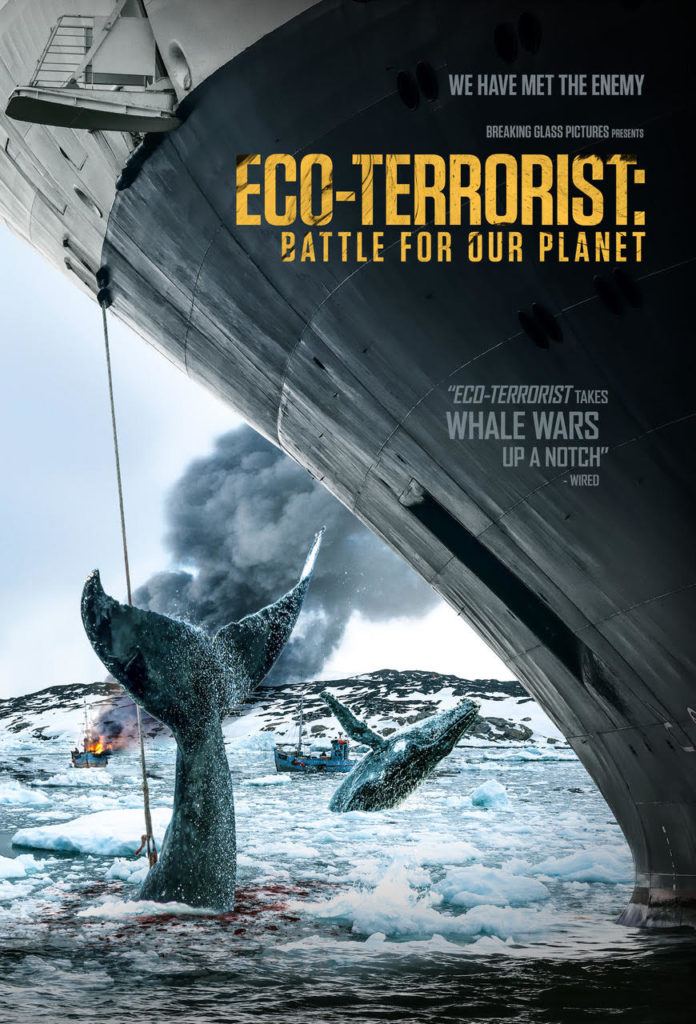
Most of what the public sees about Sea Shepherd is filtered through their founder, Paul Watson. Watson has pursued as much media attention as possible since founding of the organization, and has a hero/rock star status among many animal activists. Love it or hate it, this strategy has definitely meant more attention and more funding for the organization. It’s a nice change of pace, though, when so much coverage is focused on Watson’s particular perspective and personality, to hear about Sea Shepherd from someone else.
This alternative perspective is exactly what we get from the new documentary, Eco-Terrorist: The Battle for Our Planet. The film, which began screening in the United States on October 1st, was directed and produced by Peter Jay Brown, Sea Shepherd’s longest-serving crew member and former first mate to Paul Watson. In an interview with Peter, we discussed the new film, his misgivings about Sea Shepherd’s post-Whale Wars trajectory, and the value of passion as a guiding principle.
Dylan Forest: Sea Shepherd has had an unusual amount of media coverage for an animal protection organization. Why did you want to make this film, too? What else did you think needed to be said?
Peter Jay Brown: Sea Shepherd was originally an ocean conservation organization. We attracted animal rights advocates and vegans, as we were the only game in town, a sort of the Earth First! of the seas. In 2019 it seems to me that Sea Shepherd has lost its way, and I feel that as the organization’s longest-serving volunteer, I should say something.
I made this film as a film about tactics. I used Sea Shepherd as my subject matter because for so many years, I was a big part of it. The film ended with a question: “Will Sea Shepherd ever be as effective as it was when it didn’t have a pot to piss in?” My answer is no, but I left the question for the audience to answer. My opinion is this: passion always wins out over money. I wanted the film to start a dialogue about actually doing something about the issues facing us all, without padding someone’s pocket. That was my point.
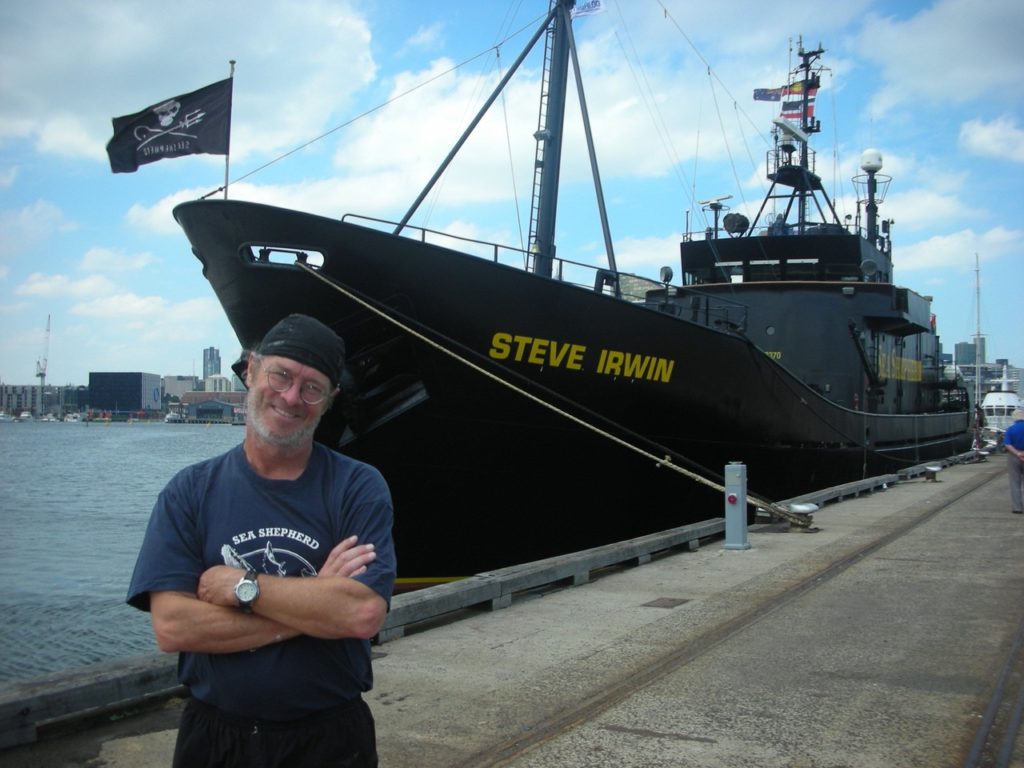
In the film, you talk nostalgically about the early years when Sea Shepherd could get away with nearly anything, because they were “protected by poverty,” without much to lose. With so much more money and awareness of the organization, I imagine there have been some upsides too. Do you think it has been an overall gain for the cause to do the show Whale Wars and to push for so much media coverage?
I agree that more money means more action, which is especially good for TV. What I don’t see in the present day organization is a real passion to end anything. Watson is much like Donald Trump; it’s all about the deal. Back in the day Mr. Watson was on shows seen by 40-50 million people. He was called on to comment on international issues on network news. After Whale Wars, a show I think had a viewership of 2 million people, Watson, as a washed up reality TV star, now preaches primarily to his little social media cult. The general public knows nothing of him. Charity Navigator has dropped their rating of Sea Shepherd.
Presently, if you look, Sea Shepherd is in bed with third world governments around the world. I believe an NGO should not get in bed with governments in general, and especially when used to do the work national navies should be doing. Much of what is being done seems like well-produced propaganda. Today Mr. Watson seems to spend more time on his film star career than doing anything really effective. I wish Sea Shepherd well, I just don’t see them as very effective anymore.
As you note in the film, Sea Shepherd was formed by Watson after he left Greenpeace for what he perceived as the ineffectiveness of protest vs. direct action. What do you think about this divide? Is direct action the only way for animal activists to make progress?
I am not Watson and never was him. I feel that all things done in a positive way are welcome. I tend to support the tactics I believe will work. Sometimes protest works! What I am against is people doing nothing. Hell, I’ll take anything positive. As Nike says: Just Do It!
I just want people to forget the big ego-corporations and do something themselves. Have passion and start something, and it will grow. If you do it because it is the right thing to do, we’ll all be better off.
Do you think an activist getting into direct action today needs to have different concerns and priorities than, say, 20 or 30 years ago? Is it a different world now for all animal activists, not just for Sea Shepherd?
I think an activist needs the same thing today as activists needed since day #1. They need a conviction they absolutely believe in, and they need the passion to take action. Then they need the back bone to stand up and take the hit. Consequences are a bitch! A dedicated activist needs to take all this into account and then figure out how they are going to get out alive.
How about in terms of support from the public? Do you think the public is more supportive today of the type of work Sea Shepherd does?
When you mention what Sea Shepherd does, I assume you mean the old Sea Shepherd. It was explained to me that I did not understand what the new Sea Shepherd did. As far as I could understand it they do nothing nothing but make film, and photo ops.
That being said, the old Sea Shepherd was like an acupuncture needle. We were tiny, but using the media we escalated each “video hit’ as Bob Hunter, the founder of Greenpeace, called them, to appear on every TV in the world. Back then there wasn’t much competition but through these “video hits” we exposed many criminals, and started many dialogues. This work helped start the eco movement and the public awareness you do see today.
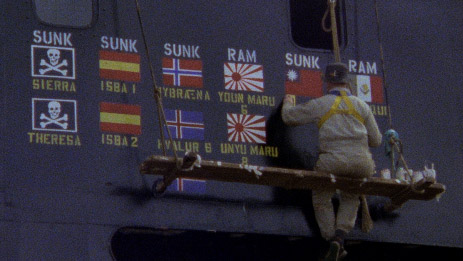
You don’t really see a lot of focus on whales or other animals themselves in coverage like Whale Wars; it’s much more about the action of the battle between Sea Shepherd and the bad guys. Do you think in this type of activism there is a threat of losing sight of the animals?
Whale Wars was a TV show. Reality television is not real. In my opinion Whale Wars was the beginning of the end for Sea Shepherd. I quit because I felt the TV show became more important than the mission. I felt that unnecessary risks were being taken because of the cameras. The story was cut like a bad soap opera, and I felt that it should have emphasized the real passion of the volunteers and focused more on the beauty and importance of the whales. They did not even discuss the real issues. At times it seemed like more of a party than the dangerous adventure being attempted to stop a long running whale slaughter.
Watson is known for his controversial tactics, which you cover some of in the film. One such tactic is deception, sometimes of the public. One example of this would be Watson faking a gunshot from a whaling ship. Do you think there can be any harm in lying or misrepresenting things in the name of strategy, what you call “playing chess” in the film?
In the beginning we were all bluff. As time went on it worked, so I had no problem with “red flag” operations and deceit. On my last voyage south, I orchestrated a fake drone launching which kept the Australian press active a few days. It’s all part of the game.
I do think that the fake gunshot stunt went too far and showed the character of the captain. Just making that play leaves crews vulnerable in the future. It was fake TV and did not accomplish anything. Why’d he do it? The word ego might come to mind. As First Mate I did damage my credibility by reporting it through official channels. It cheapened everything that followed and cheapened our efforts as an organization. The fake bullet hit in the exact center of the fake police badge. That speaks volumes.
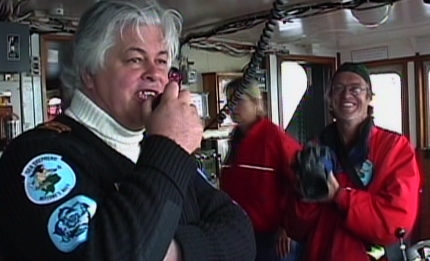
There’s something kind of genius about the tactic of simply occupying the time of the people you’re trying to stop. We’ve seen this a lot from Sea Shepherd, using distraction just to tie up the time and energy that would otherwise be used to kill animals. These strategies can look silly or ridiculous, but in practice they mean each day spent dealing with you is a day whalers can’t kill whales, for example. Has this been an effective tactic? Has it actually meant fewer whales are killed each year?
They work but one can’t expect to win anything if you have nothing else. I haven’t been to the Faroe Islands for years, as I have seen nothing new being done to stop the annual whale slaughter there, as far as tactics are concerned. I really think a whole new set of tactics need to be used. The definition of insanity is to take the same actions over and over and to expect different results.
That is no longer my fight, as I am presently on site in Friday Harbor, Washington to help deal with orca whale harassment. Up here we are all volunteers, by the way. It has not been easy, but our support is growing. You can learn more and get involved on our website.
At the end of the film, you pose the question of whether Sea Shepherd can survive into the future. What do you think its biggest obstacles are?
In my opinion, Sea Shepherd has become a bit of a personality cult. Quoting the comic strip Pogo: “We have met the enemy, and the enemy is us!”
There are plenty of issues in this great time of need. I want people to realize that they should not put blind faith in governments or large eco-corporations. Behind your backs they are spending money like drunken sailors, and nothing is getting done. Trust yourselves, and get active!
Featured image: Peter Jay Brown and another crew member in front of a Sea Shepherd vessel. This image and all other images in this story via Peter Jay Brown.

